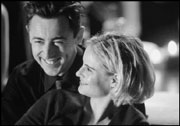THE ANNIVERSARY PARTY
written and directed by Alan Cumming and Jennifer Jason Leigh with Alan Cumming, Jennifer Jason Leigh, Gwyneth Paltrow, Parker Posey, Kevin Kline, and Phoebe Cates opens June 22 at Guild 45 and Meridian
STAR POWER manifests itself in funny ways. First you’ve got Alan Cumming and Jennifer Jason Leigh collaborating on this movie, which opened SIFF with its U.S. premiere, then you’ve got their characters, a husband and wife struggling with their fraying Hollywood marriage. A novelist hoping to direct, Joe’s on his way up, while actress Sally seems to be on her way down. Sure, they’ve got the glassy, almost transparent Richard Neutra house, servants, and suitably hip friends, but that facade must inevitably be shattered.
Elements of both The Big Chill and soap operas—bad marriages, career pressures, unwanted children, secret abortions, near-fatal accidents, adulterous longings, lost dogs—also receive a millennial twist: Everyone takes ecstasy about 90 minutes into the picture (just when you’re looking at your watch), and disastrous disinhibition results. Everyone’s got secrets, it turns out, all of which need airing. As a result, Party‘s capital-T thespianism makes the film feel like an actors’ workshop or Robert Altman meets The Real World. Yet Party‘s a flick that will resonate with Gen-Xers uneasily assuming—or shirking—adult responsibilities (even if we’re not half so glamorous as the guests). And its big, talented ensemble cast does provide plenty of laughs, groans, and moments of recognition along its ragged path.
Gwyneth Paltrow plays—what else?—the naive blond superstar who both eclipses and worships Sally, making for amusing cattiness between them. Parker Posey is wasted in a slight supporting role (like Magnolia‘s clenched John C. Reilly), but at least she gets to cavort with Happiness‘ twitchy, mannered Jane Adams in a very funny Esther Williams-style (topless!) aqua ballet. Leigh’s her usual glum self, framed in preening, narcissistic close-ups, and here subjecting herself to verbal put-downs instead of her usual masochistic Last Exit to Brooklyn-style sexual degradation. Cumming does his standard fey-volatile shtick. Uncredited musicians perform. (Who are they? Apparently it’s not important that we know.) Real-life marrieds Kevin Kline and Phoebe Cates and their real-life kids play, surprise, a happily married couple with kids. He recites a bit of Matthew Arnold’s “Dover Beach” for no apparent purpose, but the real surprise is Cates’ deft comic performance; she’s the best thing about the movie.
Problem is, you have to suffer through endless personal revelations, heartfelt toasts, and even a game of charades (!) for the presumed benefit of these pampered, neurotic characters’ catharsis. “We’re way past inappropriate,” Joe apologizes to his neighbor Monica (Mina Badie, Leigh’s half-sister and a fine actress). The idea is that all this soul-baring is supposed to mean something, but mainly it means that—were we even invited—here’s a party we wouldn’t want to attend.
Scotsman in Seattle
VISITING TOWN during SIFF, Alan Cumming noted how The Anniversary Party is being judged both for its story and its digital video technology. “We’ve done a film on DV that is not a typical kind of DV film,” he says. “It doesn’t have whip-pans all the time. It’s actually quite sedately shot. I think the language of video that people are used to is all jiggly.”
Speaking for his co-director Leigh, he adds, “We’ve now become this kind of poster boy and girl for DV, and we actually are saying, ‘Well, it was all right—lots of good things, but there’s many bad things about it.’ Actually, because it was on DV, it was much more laborious in postproduction. The good thing about the DV was that we were able to shoot quicker. Because it was so cheap, you could keep running [the camera], and it made for a relaxedness and an air of intimacy—and therefore a kind of eavesdropping quality to the film. But in post it was a nightmare.”
And what about film purists who resist DV? “Everyone has stories to tell,” concludes Cumming, “and DV is a great thing because it does enable more people to tell stories more cheaply. And I think that’s great. I don’t feel pushed around by the technology.”
Brian Miller








